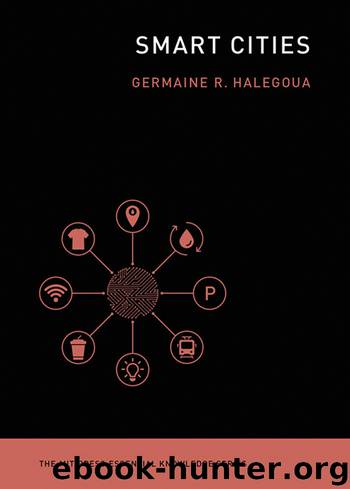Smart Cities by Germaine Halegoua

Author:Germaine Halegoua [Halegoua, Germaine]
Language: eng
Format: epub
Publisher: The MIT Press
Published: 2020-05-08T00:00:00+00:00
Critiques of Smart Technologies
After implementing sensor and IoT technologies, Barcelona’s chief technology officer noticed that the city had accumulated immense amounts of data across different platforms. Although data accumulation was the plan from the start, many of the platforms and technologies worked independently of one another, weren’t integrated on the same platform, and much of the data collected was not being utilized by city hall or citizens. When city hall realized that employees and department directors weren’t utilizing data collected for policy and decision making, they could have decided to limit the amount and type of data collected or selectively gather and analyze data to investigate particular questions about urban systems. Instead, the city decided to open the datasets to the public and install a city-managed, open source sensor network to collect even more data about the city and its citizens.28 The solution for obtaining too much unusable data was to collect even more, and to crowdsource labor to find some use for it.
“Big data,” or huge amounts of digital information that are collected from a variety of sources and layered or aggregated to produce knowledge, has become the cornerstone of smart cities. As Sarah Brayne explains in her study of policing in Los Angeles, big data has been embraced by a range of organizational actors as a means toward improving efficiency by predicting problems before they occur, allocating resources, and filling informational gaps in analysis.29 But many of her study participants also expressed that big data and predictive analytics were what organizations felt they ought to do in order to be read as legitimate. In many ways, motivations for adopting big data and predictive policing echo reasons for adopting smart city technologies more generally: a combination of the desire to improve efficiency as well as the pressure not to be left behind.
Seeing more technology or data as a remedy for issues concerning how to use technology and data reinforces the definition of digital infrastructures and computation as foundations of the smart city. However, many smart city critics also fall into the same sort of technological solutionism as smart city proponents: perhaps the city needs better technologies, or maybe these technologies are being misused. While there is nothing wrong with embracing technological advancements to potentially improve cities, the folly is believing that data-driven decisions alone will produce socially just urban environments, governance, or resource management.
Download
This site does not store any files on its server. We only index and link to content provided by other sites. Please contact the content providers to delete copyright contents if any and email us, we'll remove relevant links or contents immediately.
| Computer Vision & Pattern Recognition | Expert Systems |
| Intelligence & Semantics | Machine Theory |
| Natural Language Processing | Neural Networks |
Algorithms of the Intelligent Web by Haralambos Marmanis;Dmitry Babenko(7852)
Hadoop in Practice by Alex Holmes(5660)
Jquery UI in Action : Master the concepts Of Jquery UI: A Step By Step Approach by ANMOL GOYAL(5514)
Life 3.0: Being Human in the Age of Artificial Intelligence by Tegmark Max(4508)
Functional Programming in JavaScript by Mantyla Dan(3723)
The Age of Surveillance Capitalism by Shoshana Zuboff(3423)
Big Data Analysis with Python by Ivan Marin(3014)
Blockchain Basics by Daniel Drescher(2891)
The Rosie Effect by Graeme Simsion(2708)
WordPress Plugin Development Cookbook by Yannick Lefebvre(2602)
Hands-On Machine Learning for Algorithmic Trading by Stefan Jansen(2519)
Applied Predictive Modeling by Max Kuhn & Kjell Johnson(2480)
Dawn of the New Everything by Jaron Lanier(2438)
Test-Driven Development with Java by Alan Mellor(2388)
The Art Of Deception by Kevin Mitnick(2298)
Data Augmentation with Python by Duc Haba(2233)
Rapid Viz: A New Method for the Rapid Visualization of Ideas by Kurt Hanks & Larry Belliston(2195)
The Infinite Retina by Robert Scoble Irena Cronin(2181)
Human Dynamics Research in Smart and Connected Communities by Shih-Lung Shaw & Daniel Sui(2178)
